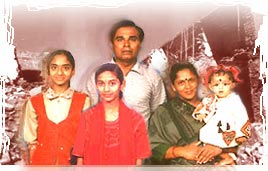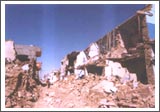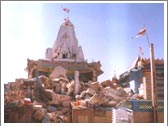The Rediff Special/ Ramesh Menon


The walled city of Bhuj looks like a bombed out town. Its residents are now housing in camps. Or with relatives elsewhere. Some people, though, have refused to leave the city. Roving Editor Ramesh Menon meets one such family, who are living next to their collapsed house. What is it that makes them stay back while the stench of death is still in the air?

Ishwargiri Gangagiri
|
Ishwargiri Gangagiri refuses to leave Bhuj. There is not one house near his home that has been able to bear the brunt of the quake. His house was next to the Bhuj Fort wall, which gave way during the quake. The fort, which was last repaired by Maharao Desalji I (1719-1752), has cracked and collapsed in various places.
Ishwargiri was in the bathroom when the earth rumbled. At first, he could not figure out what was happening. He knew, though, that something was seriously wrong and ran out to pick up his two-and-a-half year old son, Jaymit, who was asleep. Remembering what his grandfather had once told him -- that the lintel (horizontal beam used as a finishing piece over a door or window) was a safe option when an earthquake struck -- that's where he stood. It was a decision that saved their lives.
His daughter, Vaishali, had gone fill water from a tap next to the fort wall. When the quake struck, the walls around her came tumbling down. The only bit left was the one standing behind her. The fact that she had frozen with shock probably saved her life. She survived without a scratch. As did his wife, Dimple, who is a nurse in the army.
His other daughter, Arti, 14, was watching the colourful Republic Day parade on television. She managed to run out when the quake began.
The Gangagiri family stood in the dust raised by the debris, wondering why they were spared. "God saved us," Ishwargiri found his answer. "Does this not look like a miracle to you? Everything has gone. Our house is in ruins. But we are alive.”

The devastated houses of Bhuj
|
They had renovated their house just seven months ago. "I think I have lost over Rs 350,000. But I do not feel like a poor man. My family is alive and well. God will take care of us even if another quake comes. We have conquered fear. Even at night, when there is deathly silence, we are okay."
Why did God have to do this to him?
“Maybe we sinned,” he says simply.
After the quake, he walked gingerly towards the richly painted temple of Lord Shiva. It had been with his family for at least 150 years. The stone temple, which is located next to his house, had serious structural cracks. It was difficult to get in, as the pathway leading to it had crumbled.

A ruined temple
|
Yet, the temple was standing. Precariously. For the Gangagiris, the decision was made. They would not abandon their temple. As long as it stood, the daily puja would be done. He still manages to go in every day and light an oil lamp. Outside, he lights agarbattis (incense sticks).
More than 48 hours before the quake, Ishwargiri noticed that his dog, Moti, would not stop moaning. Their goat, Julie, took to standing on her hind legs on and off. The crows cawed through the night. When Ishwarbhai asked his 82-year-old mother, Gomtiben, why this was happening, she said they were signs of an impending environmental disaster.
"Can nature give us signs science cannot?" asks Ishwargiri. "If we had understood the language of our pets, we could have averted many deaths." Julie was crushed to death under the debris. On the day the family buried her, both Arti and Vaishali did not eat anything. They were very attached to their goat.
Elsewhere, hundreds of pyres were lit in the town; bodies were being recovered by the minute.
Today, the Gangagiris say they are happy God has given them a second lease of life. Ishwargiri found a tent that had been abandoned by relief workers. Today, it is his home. Their three children dress in clean clothes; Jaymit and his antics, in particular, help them cope with their trauma, while Arti and Vaishali want their school to start again.
Ishwargiri, who works for the airforce as a general mechanic, refuses to leave Bhuj. He also refuses to stand in long queues for relief supplies. “I am a government servant," he says. "I cannot accept anything from anybody."
He has managed to get some supplies from his office and says he is actually in a position to make me some tea. "Every moment, we feel grateful to God for having spared us. The only way we can repay His kindness is to stay back and guard the temple and continue all the rituals as if nothing has happened,” he says.
How did Ishwargiri get his family to abide by his decision? "I always said, think of the future. The past is over. We must think of how to rebuild and get back to normal. For us, this has been Life's greatest experience. It has made us tough. It has taught us to be grateful."
This, despite the fact that none of their eight rooms, two kitchens and two bathrooms are fit to use. Five people from Ishwargiri's uncle's family in Bhuj have died. His sister is lying injured in hospital. His nephew’s daughter had to have her left hand amputated. Another close relative had both her kidneys damaged; her condition is said to be serious. So, where does their strength come from?
"Prayer," he says quietly. “This is God’s way of teaching us a few lessons. Look at the rich today. They are all on the road with the poor. It is God’s way of teaching us humility."
Photographs: Ramesh Menon. Design: Lynette Menezes
The Complete Coverage | List of earthquake sites
Back to top